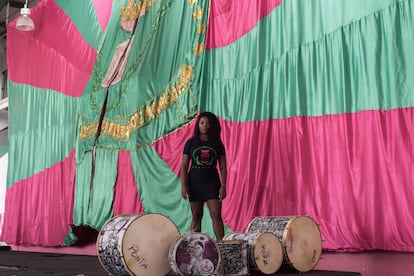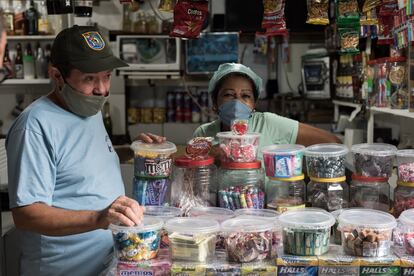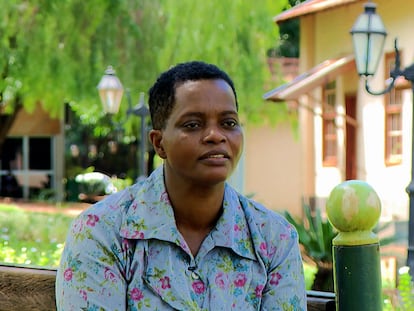How Brazilians are struggling to come to terms with a 2021 without Carnival
Squel Jorgea from the Mangueira samba school talks to EL PAÍS about the impact the cancellation of the famous event due to the coronavirus has had on the country, particularly Rio de Janeiro


It’s Carnival, but the headquarters of the Mangueira Samba School in Brazil are deserted, dreary and strange. Any other year, this rehearsal space in the Rio de Janeiro favela of Mangueira would be bustling with samba dancers overflowing with joy and nerves. The flagbearer, Squel Jorgea Ferreira Vieira, 38, is holed up in a hotel, together with the rest of the artists who lead the troupe. The 4,000 sambistas from Mangueira should be getting their elaborate costumes together at this time of year – an explosion of colors, sequins and feathers – for the Carnival parade, a fiercely competitive event, images of which are seen around the world every year. But Rio and the rest of Brazil have been left without the 2021 Carnival, being robbed of one of the most hotly awaited moments of the year.
It irritates me that people don’t understand our painSquel Jorgea Ferreira Vieira, samba flagbearer
Thanks to the coronavirus pandemic, the Sambadrome – the purpose-built parade area for the Carnival designed by Brazilian architect Oscar Niemeyer – will not see a single dancer or float this year. Instead, it will be welcoming the over-80s, who are being vaccinated there without having to leave the comfort of their cars. This year will enter Carnival history, because while the event was suspended in 1892 and 1912, it was successfully held several months later. This time around, that option is not on the cards.
“No one imagined Rio de Janeiro without Carnival,” explains Ferrera Vieira at the school. Granddaughter of a legendary figure from the event, she has been part of the parade since the age of nine. “It’s as if I were in the middle of a sea drowning, trying to breathe,” she explains. “I’m completely desperate, and very, very sad.”
This time of year is normally when people forget about their everyday hardships, decorate their houses to welcome friends and buy special clothes for the occasions. Each Carnival is different – there have been years of crisis, boom times, repression, few tourists or many – but no one could have predicted the desolation that the pandemic would bring.

News of the first coronavirus infection in the country, detected in a businessman who had visited Italy, came on Ash Wednesday in 2020. One year on, and coolboxes are not packed with beer, but rather the vaccines from China like the one that was injected into Rosa Nina Coelho, 85. She’s a native of Rio de Janeiro who, in one of life’s little ironies, had never set foot in the Sambodrome before getting her inoculation.
The mayors of Rio, Salvador da Bahia, São Paulo, Recife and Olinda took it for granted months ago that celebrating the big party of the year – which brings together millions of people, attracts tourists from all over the world, and gives employment to hundreds of thousands of people – would be unworkable while the virus was circulating at great speed. In the middle of an uptick of cases, the fiestas were canceled. Brazil has suffered nearly 240,000 Covid-19 deaths and nearly 10 million infections, according to the official data. Rio is now officially ruling out delaying the celebrations until July.
The streets of Rio are deserted and have an air of sadness about them. There is not a single glitter-adorned body, garland of flowers or costume to be seen. The mayor, Eduardo Paes, who is a big fan of the celebrations, has called for common sense while at the same time sending out the police to put a stop to clandestine gatherings and crowds. The atmosphere is one of depression, a far cry from the happiness that the Rio locals usually give off.
The Carnival has given Squel Jorgea’s life structure for the last two decades. “This is my profession, it sustains my family, and has given me a dignified life and wisdom,” says the flagbearer, who has been receiving a steady stream of affectionate messages of support and condolence. She stresses that while most people think that what is arguably the biggest spectacle in the world is just a four-day thing, there is a huge industry behind it – cruise ships, hotels, bars, restaurants...

“But there is also the street hawker who sells beers or popcorn on the rehearsal days,” she explains. “The woman who sells flowers to supplement her income. The seamstresses, the cobblers…” All of them, without work.
The cancelation of the Carnival means losses of eight billion reales (which works out at around €1.2 billion, or $1.5 billion) according to trade associations. Half of that amount has been lost in Rio. A total of 25,000 temporary jobs have failed to materialize as a result. Last year, each tourist spent an average of €100 ($120) a day.
To combat the nostalgia, TV network Globo is broadcasting the best moments from previous parades, while artists are sharing their performances via YouTube, and institutions such as the Rio Modern Art Museum (the MAM) is coming up with initiatives for Carnival without celebrating it. Among these was a series of conferences and workshops organized in conjunction with Mangueira, and which left Squel Jorgea with an unforgettable moment: “I never imagined that I would be invited to a museum, that I would enter through the front door to give a class,” she explains. “Or that people who want to understand my art would buy up all of the tickets.”
If we are going to have a Carnival in February 2020, the preparation of costumes and floats will need to start in June or JulySquel Jorgea Ferreira Vieira, samba flagbearer
Samba is a style of music and dance that was born in the poor, Black neighborhoods, and which, to the annoyance of this star from Mangueira, have no value in cinema, television or ballet in the eyes of other Brazilians. “It irritates me that people don’t understand our pain,” she complains.
While everyone in Brazil is aware of the business that Carnival brings, the celebration also has its critics. A microscopic virus has turned one of the dreams of the most extreme Evangelical and Christian churches into a reality. For them, the Carnival is the incarnation of evil. J. P. I., 64, and his wife, M. R. T., 60, are delighted. Both Catholics, they suspect that last year’s event was the ideal breeding ground for coronavirus infections. “It’s a diabolical fiesta, which separates couples, and is for vandals who destroy our heritage,” they explain, speaking from the store that they run. They are proud that their children have also turned their back on the event.
Brazilians are hoping that mass vaccinations will let them get back to normal and bring back their big yearly celebration. But the Mangueira flagbearer, who knows all too well that a troupe needs months of research and planning for every detail, is concerned. “If things don’t move quickly, it will be another difficult year,” she explains. “Because if we are going to have a Carnival in February 2020, the preparation of costumes and floats will need to start in June or July…” A second year without the Carnival would be a massive disappointment. For now, just 2.3% of Brazilians have been vaccinated, and problems are looming. Earlier this week, Rio announced that it had suspended its campaign due to a shortage of doses.
English version by Simon Hunter.









































